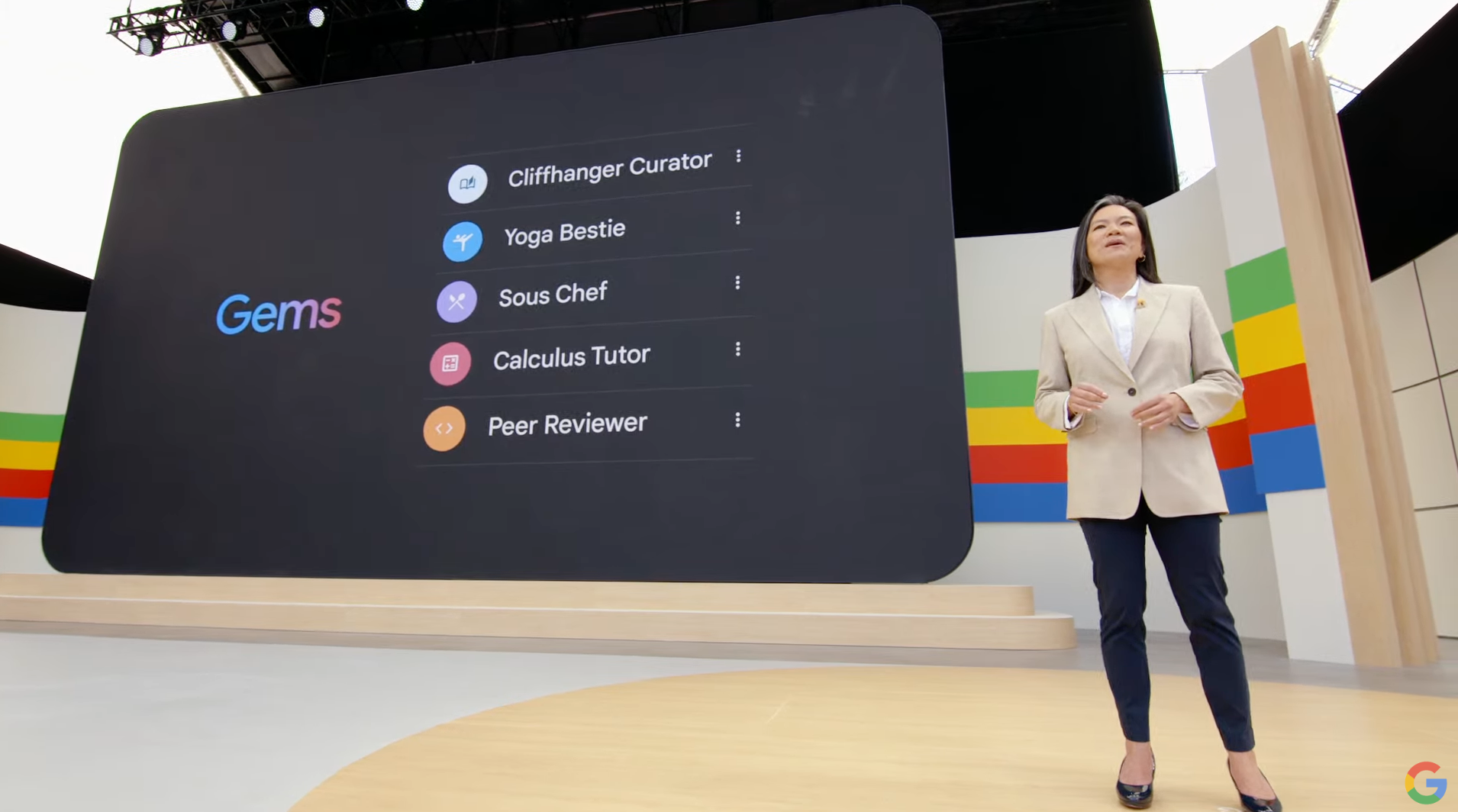No thanks Google, I don’t want an AI yoga bestie
Google’s new Gems feature offers customized AI experts

Sign up for breaking news, reviews, opinion, top tech deals, and more.
You are now subscribed
Your newsletter sign-up was successful
Like many TechRadar readers, I’ve just finished up watching Google IO 2024, and seeing all the new stuff that the Gemini AI is capable of. As I was listening, I was very interested from a layman’s point of view, but as TechRadar’s Fitness and Wearables Editor, I didn’t think there was much in it for me. I was certainly disappointed by the lack of a Wear OS 5 announcement.
But my ears pricked up as Sissie Hsaio, Vice President at Google and General Manager for Gemini experiences, showcased how to use Gemini best within the multimodal Gemini app, with a new feature previewed known as Gems. Set to be released in the coming months, Gems essentially saves successful specialist prompts for you to build on later. Hsaio creates a Gem in front of the audience called a “cliffhanger curator” designed to help her write intriguing plot twists into short stories.
“Gems are a great timesaver when you want to interact with Gemini in specific ways again and again,” said Hsaio. “Gems will roll out in the coming months and our trusted testers are already finding so many creative ways to put them to use. They could act as your yoga bestie, your personal sous chef, a calculus tutor…”
And there it was. The moment I heard “yoga bestie” I began to cringe, as I knew artificial intelligence was making its presence known in the health and fitness space once again.
Gemini is, like all artificial intelligence, a service designed to make your life easier. That goes without saying when it comes to answering emails, summarizing conversations and generating images of cats playing guitars. However, in the cutesy video following Hsaio’s presentation, a user also asks ChatGPT for a workout routine to get bigger calves, among other requests to rephrase emails or suggest memoir titles.

The health and fitness space is different to a lot of information-processing requests, in that it requires physical action and repetition. I used to believe you can’t automate getting stronger, you can’t streamline running, and you can’t use an AI to get better at yoga. I still sort of believe it. But, by the gods, Big Tech is certainly going to try, and it will eventually succeed through brute force. It’s already half-convinced me that AI has a place in the gym, against my better judgement.
My first inkling this was happening was through the best Garmin watches’ algorithmically-generated recommended running workouts. Then came MWC 2024 this year, when I saw the potential of AI to map human performance through footage. We’re about to see a lot of people ask Google Gemini for workout advice, just like that promotional video.
Sign up for breaking news, reviews, opinion, top tech deals, and more.
I have my own reservations about giving AI services unfettered access to my historic health information, despite Hsaio’s assurance that “your files are not used to train our models”. I would also be cautious in following any sort of fitness suggestion from a service that can’t talk about injuries, personal limitations, existing conditions and so on. However, I’m a big hypocrite, because I’ve still followed several of Garmin’s recommended workout structures. So why does the idea of artificial intelligence playing a role in consumer wellness make my skin crawl, if it’s a useful inevitability?

I believe, after a quick bit of soul-searching, I feel uneasy about the intrusion of AI into a physical space, especially one focused on practices of mindfulness and being in touch with your body, like yoga. In an ideal world for your average Big Tech executive, we will never uncouple from our phones, laptops and apps at all, and as someone who spends a lot of my waking hours staring at a screen, exercise (especially yoga, which encourages the practitioner to spend time looking inward, rather than at blue-light sources) is my great uncoupler.
If you don’t have access to in-person yoga classes and want some guidance that you’re not getting via video workouts on YouTube, Gemini may be able to offer some decent yoga pointers and suggest popular sequences of moves, and describe how to perform those moves. However, don’t be fooled by the idea of a virtual “yoga bestie”. Google’s great at this relaxed, friendly, helpful-sounding language, but is a bestie really a bestie if it wants something from you?
Mostly, it's your subscription fee to the Gemini app, but it also wants you to continue to build on your “yoga bestie” Gem with prompt after prompt, to make it better. It wants to learn from you, taking the essence of an exercise designed to ground you in the real world, and tranfiguring it into data points, sending it back to Google’s servers for other algorithms to pore over.
Gemini may be capable of improving your exercise habits, when used carefully, but taking a virtual service that represents everything about the data-driven commoditization of modern life, and bringing it into a mindful, physical space, feels a bit wrong to me.
So, no thanks Google. I don’t want to be yoga besties with you.
You might also like

Matt is TechRadar's expert on all things fitness, wellness and wearable tech.
A former staffer at Men's Health, he holds a Master's Degree in journalism from Cardiff and has written for brands like Runner's World, Women's Health, Men's Fitness, LiveScience and Fit&Well on everything fitness tech, exercise, nutrition and mental wellbeing.
Matt's a keen runner, ex-kickboxer, not averse to the odd yoga flow, and insists everyone should stretch every morning. When he’s not training or writing about health and fitness, he can be found reading doorstop-thick fantasy books with lots of fictional maps in them.